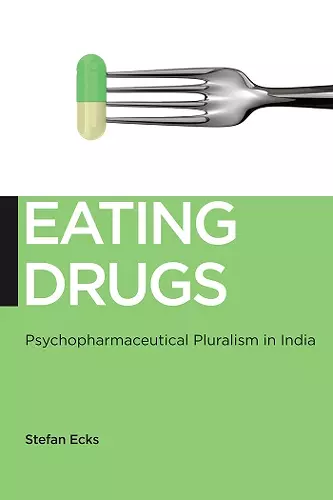Eating Drugs
Psychopharmaceutical Pluralism in India
Format:Hardback
Publisher:New York University Press
Published:29th Nov '13
Should be back in stock very soon

A Hindu monk in Calcutta refuses to take his psychotropic medications. His psychiatrist explains that just as his body needs food, the drugs are nutrition for his starved mind. Does it matter how—or whether—patients understand their prescribed drugs?
Millions of people in India are routinely prescribed mood medications. Pharmaceutical companies give doctors strong incentives to write as many prescriptions as possible, with as little awkward questioning from patients as possible. Without a sustained public debate on psychopharmaceuticals in India, patients remain puzzled by the notion that drugs can cure disturbances of the mind. While biomedical psychopharmaceuticals are perceived with great suspicion, many non-biomedical treatments are embraced.
Stefan Ecks illuminates how biomedical, Ayurvedic, and homeopathic treatments are used in India, and argues that pharmaceutical pluralism changes popular ideas of what drugs do. Based on several years of research on pharmaceutical markets, Ecks shows how doctors employ a wide range of strategies to make patients take the remedies prescribed. Yet while metaphors such as "mind food" may succeed in getting patients to accept the prescriptions, they also obscure a critical awareness of drug effects.
This rare ethnography of pharmaceuticals will be of key interest to those in the anthropology and sociology of medicine, pharmacology, mental health, bioethics, global health, and South Asian studies.
In Stephan Ecks' poignant ethnography, he illuminates the relationship between digestive health and mental health in Calcutta, paying particular attention to the contributions this relationship has made to a pharmaceuticalized India. -- Erica Rockhold * Science, Medicine, and Anthropology *
Provides an enthralling account of the depth of cultural forces that shape the subjective experience of mental illness and contemporary psychiatric practice. A powerful contribution to the anthropology of pharmaceuticals, this book is essential reading for anyone interested in culture, science, and technology, and the startling transformations of bodily experience in the 21st century. -- Janis H. Jenkins,editor of Pharmaceutical Self
"Anthropology has much to contribute to our understanding of global pharmaceutical uses as it is sensitive to local culture and emerging health concerns, as well as to the business of selling drugs. This ethnography provides an outstanding example of this exciting new field of research. Its focus on the pharmaceuticalization of mental health by pluralistic health care systems in India provides a compelling case study that illustrates the ways in which explanatory models of medicines and illnesses intersect, and the ways different systems of medicine position themselves and engage in a politics of distinction at the site of the body.
-- Mark Nichter,Regents Professor, University of ArizonaA masterful critique of the ever-expanding pharmaceuticalization of mood disorders and self-care in the Global South. Brilliantly argued, the book makes public the cultural calculus of therapeutic markets while also affirmingand this is keythe plural ways in which people can be agents of their health. -- Joao Biehl,Susan Dod Brown Professor of Anthropology, Princeton University
A micro-analysis of medical culture change . . . . A significant, difficult-to-achieve advancement.-Kalman Applbaum,University of Wisconsin * Milwaukee *
Brilliantly traces the circulation of metaphors of affliction from practitioners of psychiatry, Ayurveda, and other systems of medicine to the streets of Calcutta and back, showing how mind-body relations are constructed, mediated, and transformed. Readers who seek to understand the interplay of professional practice and local knowledge in the globalization of psychiatry, the pharmaceutical industry, and cultural configurations of the self will find this book richly rewarding. -- Laurence Kirmayer,James McGill Professor, McGill University
WhileEating Drugsis best classed as an ethnography of Indian medicine, it is also a rich work of epistemological reflection that will appeal broadly to a number of scholars in the medical humanities, bioethics, medical sociology and anthropology, health communication, and science and technology studies. * New Genetics and Society *
Eating Drugsis a meticulous account of medical pluralism in India today. Ecks convincingly demonstrates how, in West Bengal, medical problems will necessarily be plural given the sway of humoral, ayurvedic, homeopathic, and allopathic forms of reasoning. * Asian Medicine *
[] Eating Drugs stands as a critical addition to work on pharmaceuticalization andvernacularization of psychosomatic therapies in South Asia. * American Anthropologist *
ISBN: 9780814724767
Dimensions: unknown
Weight: 499g
233 pages